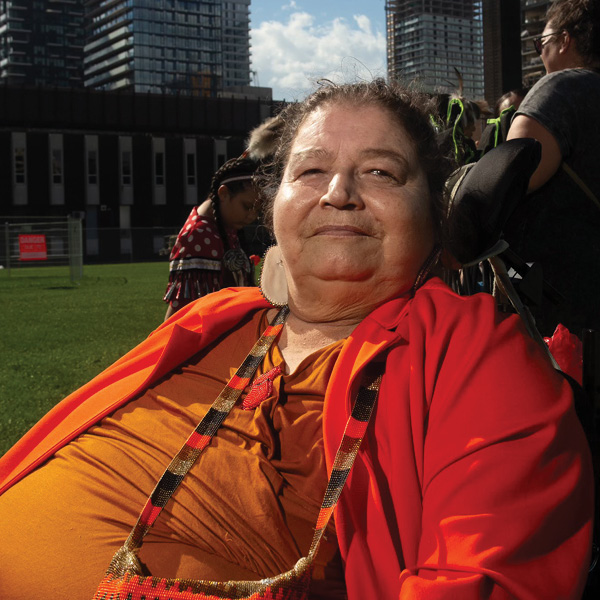Remembering Wanda Whitebird
Did you know that “harm reduction is not about using drugs ... it’s about unconditional love and about being there on your own terms.”– said Mi’kmaq Elder, Wanda Whitebird in Northern Feathers: Love, Culture, Harm Reduction.
A passionate harm reduction advocate, Wanda sadly passed away in November 2024. She taught us that there are major gaps within our healthcare system causing systemic harm to Indigenous peoples, making the need for culturally-relevant programs that address the health and wellbeing of Indigenous communities both obvious and urgent.
While we recognize that lasting and profound change to decolonize healthcare requires policy-level action, we ’re working at a programmatic level to address issues that intersect with substance use for our Indigenous clients through community-based, Indigenous-led, culturally safe programming, like our Northern Feathers and Moccasin-making workshops that ran from November 2024 to March 2025.

Outreach and Harm Reduction Programs Bring Healthcare and Hope to People Wherever They Are
The East Toronto Outreach Project (ETOP) is breaking down barriers to healthcare by meeting people exactly where they are—whether on the streets, in encampments, or at community events. Focused on supporting people who use drugs who are at risk of sexually transmitted and blood-borne infections (STBBI) across East Toronto, ETOP workers provide trauma-informed harm reduction-based care that is rooted in dignity and compassion, without judgment.
Since 2022, ETOP has become a lifeline for many. Over the past year alone, the ETOP has connected with 241 people through 781 outreach encounters, offering essential services, safer use supplies, and support with everything from health education to navigating the healthcare system.
ETOP’s impact goes beyond STBBI prevention. Staff are leading community education efforts on safe sharps disposal and ramping up community clean-ups to reduce harm reduction litter in the surrounding community. This work is making a visible difference: this year, ETOP staff surpassed last year’s sharps container distribution and saw a 134% increase in the number of needles safely returned, reflecting strong community engagement.
Harm reduction is also about relationships, healing, and hope. That’s why we also work in partnership with many organizations to support people in holistic ways. One of our most unique collaborations is with the Toronto Humane Society which helps service users access veterinary care for their beloved pets. ETOP workers know that for many, their pets are family and supporting their pet’s health often opens the door to care for themselves. This kind of compassionate, barrier-free support is at the heart of the ETOP’s work to not only reduce harm, but to also build hope.
“This partnership has actively saved the life of numerous clients I have worked with, whether that be from reversing overdoses to providing safe supplies or building community in the face of stigmatization.”– ETOP Partner
Primary CONNECT Provides Equitable Access to Wrap-Around Services
Primary CONNECT (Collaborative Navigation Network for Connected Treatment) is a new Interprofessional Primary Care Team (IPCT) created through a partnership between SRCHC, Parkdale Queen West Community Health Centre (PQWCHC), and the Centre for Addiction and Mental Health (CAMH).
The Primary CONNECT program is part of a historic and transformative province-wide investment towards fostering more accessible and equitable healthcare for everyone. The team works across multiple sites and includes a doctor, nurse practitioner, registered nurse, community health worker, case manager, service navigators, psychiatrists, and Indigenous healers. Together, they enhance support for people experiencing mental health and substance use challenges, prioritizing those who are marginalized, racialized, Indigenous, or living on low incomes. Their goal is to break down barriers to ensure compassionate, culturally safe care to those who need it most.
“I’m proud to be part of this new team. Our collective goal is to improve health outcomes for people who are generally underserved and don’t have direct access to comprehensive care and mental health supports,” says registered nurse Max Ering, who joined the team last fall. “By working as one connected primary care team across three sites, we intend to make sure no one we serve, no matter how complex and challenging their needs, falls through the cracks.”
Passionate about delivering high-quality care to everyone who needs it, Max strives to help clients manage chronic conditions, improve their independence, and enhance overall quality of life. “Primary CONNECT is all about breaking down barriers to care and meeting people where they’re at in their readiness journey,” he explains. “When people are ready for their next step, we are too – we work together to leverage each other’s experience and expertise to provide the best possible care.”
By working as one team with a support system to efficiently integrate people into pre-existing services across multiple sites, Primary CONNECT is leading the way toward a new future of connected healthcare. Together, SRCHC and our partners are creating transformative, positive change to achieve equitable care for marginalized people with complex health needs.

With a near-death experience triggering a desire to change, Tony Williams told the Toronto Star in March 2025 that it was trust and lack of judgement from SRCHC staff that has kept him going. “They stuck with me through thick and thin …I’ve known people who have died because friends and family rejected them. This place is family and they are behind me all the way.”
